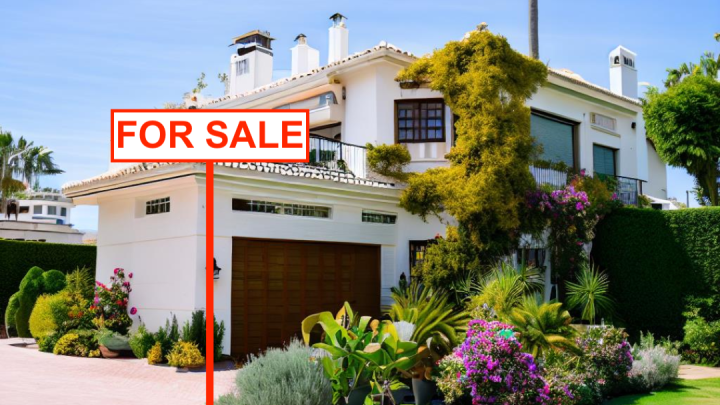Sell My House To Buy A New One
If you're considering selling your current house to acquire a new property, it is essential to familiarize yourself with the risks involved and the necessary steps to mitigate them. In this post, we will thoroughly explore the challenges associated with selling a home and buying another, providing you with valuable advice and strategies to minimize any potential inconvenience. From market evaluation to financial planning, we will offer a professional and detailed approach to facilitate a successful transition to your new home. Join us as we unravel the secrets of this significant real estate transaction.
The first step in this type of transaction is to set aside the emotional aspect of changing houses and put our rational side in charge of the operation. This is challenging because, generally, when we embark on this type of transaction, it is to move to a larger house, in a better area, with better views. However, having an overly subjective view or excessive excitement, combined with a lack of knowledge about the risks and necessary steps, can lead to serious mistakes that are difficult to resolve.
Get a valuation of your current home
Never base the value of your home on prices of similar houses you've seen on Idealista or any other real estate portal. In addition to location, square footage, and number of rooms, there are other fundamental details that we cannot appreciate in these types of listings and significantly distort these comparisons. Furthermore, the prices you see published are far from the actual market reality; one thing is what they "ask" for a house and another thing is the actual price for which it ends up selling. We also advise against relying on a single real estate agency, as it is very common for them to overvalue your house with the sole purpose of convincing you to sign an exclusive sales agreement with them. We recommend that you approach an independent appraisal agency that has experience in your area. These agencies provide a fairly objective appraisal and usually indicate a price range based on an estimate of the period from listing to sale. This last point is crucial because when we plan to buy a house based on the sale of the first one, it's important to have realistic selling times to avoid missing out on a good buying opportunity or ending up with the burden of owning two properties for an indefinite period of time. Let's continue this post as an exercise, assuming that our house has been appraised at €615,000 and the expected selling period at that price is between 3 and 5 months.
Calculate expenses and actual available funds after the sale
As you may know, if your house is valued at €615,000 and you manage to sell it for that price, it doesn't mean you will have that entire amount available to purchase the new one. Here is a list of expenses you need to consider:
- Energy performance certificate, which is mandatory to carry out the sale in a public deed before a notary. Its cost is around €100, but it varies depending on the size of the property.
- Real estate agency commission; generally, for a sale price as indicated above, it will be 5% plus VAT, so if you sell as an individual, it will end up being 6%, which is €36,900 for our example.
- If there is an existing mortgage on the property you are selling, you will have to bear the cost of cancelling it. The cost ranges between €400 if you handle the process personally and €1,100 if a management company or the bank takes care of it.
- Municipal capital gains tax (Plusvalía Municipa). This is the tax we pay to the local municipality for selling our house and it is calculated based on two methods: taking into account the increase in the cadastral value of the land on which our property is located (objective method) or the difference between the sale price and the price at which we bought it in the past (real method). The more favourable method for the seller is always used, and it is usually the objective method. We can access this information through the cadastre office. In our example, according to the objective method, we would pay €9,310.
- Income tax (IRPF). Another tax you must consider and include in your tax return, is to be settled in the following year after the sale of the house, provided that you sell it for an amount higher than the purchase price. The only positive aspect is that you can deduct all those expenses in both buying and selling transactions. In our example, we will take a value of €18,895, although this varies not only based on the difference between the purchase and sale price but also on the annual income bracket you are in. However, if what we are selling is our primary residence to buy another primary residence, then we will only have to pay taxes on the difference between the sale and purchase price. If we reinvest everything, or even if we buy a more expensive property, then we don't have to assume this cost. The deadline for reinvestment is two years. These can be both before and after the sale. But you must declare the sale in the corresponding fiscal year's tax return and subsequently indicate the reinvestment and the amount reinvested. *Just for residents in Spain.
In summary, if we sell our house for €615,000...
- €100 for the energy performance certificate.
- €36,900 for the agency commission.
- €9,310 for the municipal capital gains tax.
- Total available funds after expenses: €568,690, meaning we have lost 7.5% of the value when liquidating our real estate property.
*We will not include the cost of income tax (IRPF) since this example is based on selling a primary residence to buy another one. Both as primary residences. We assume there is no mortgage on the property.
So, theoretically, we will have a total of €568,690 available, assuming we do not want to contribute any additional savings for the purchase of the new house. Well, NO.
Calculate the actual budget available to purchase the new house
The next step is to calculate the actual price of the house we can afford if we don't want to invest more savings or take on a mortgage for the purchase of the new house.
Below is a list of expenses you will have to face, and then we will calculate the maximum price to offer based on the net amount available from the sale of your current house (€568,690):
- VAT or ITP (Property Transfer Tax). If the property is new, you will have to pay 10% VAT. If, on the other hand, it is a second-hand property, you will have to settle the Property Transfer Tax. The latter depends on each Autonomous Community, and in the case of Andalusia, it is 7%. In our example (assuming we are buying a second-hand property): -€39,808.30
- AJD (Stamp Duty): This is also a tax that is settled in the Autonomous Community where the property to be purchased is located. In Andalusia, the general rate is 1.2%. Following our example: -€6,824.28.
- Notary fees: between 0.2% and 0.5% plus the copy of the deed. In this case, approximately -€2,890.
- Secure transaction management: Obviously, if you want to carry out the operation safely and minimize the usual risks in this type of transaction, we recommend hiring our purchase and sale service (-€3,990) and property inspection service (-€399) to avoid surprises and future problems. With this service, you will become aware of any potential hidden defects in the house and avoid urbanistic and legal risks. Additionally, our team will take care of tax settlement and handle the entire process so that you don't have to worry about anything.
- Property registration: between 0.1% and 0.25%. -€350.
- Other expenses: although we are not including them in our example to simplify it, we should consider the following:
- Mortgage establishment fees.
- Connection and contracting of utilities.
- Proportional part of the property tax (IBI) for the current year.
- Real estate agency commission. Some agencies, like Tecnocasa, charge both the buyer and the seller.
- OMF check or transfer the payment to the seller at the time of the notarized deed.
In summary, from the €568,690 available after the assumed sale, we would have €514,428 available to pay the seller of the new house.
Track the market
Now that you have the actual budget and the price you can afford for the purchase of your new house, you can start tracking the real estate market in search of the house you want to buy. Remember that published prices are always inflated to some extent, and in general, you can negotiate an average of 10% without difficulty. It is advisable to maintain a cool mindset during this stage. You will come across houses that you love and feel the urge to go for them regardless of everything we have discussed so far in this post, out of fear of missing out (what is known as FOMO: Fear Of Missing Opportunity) in the investment world. No opportunity is good enough to risk our financial stability for the rest of our lives. The real estate market is always active; for every house we lose, another one will come on the market that is equal or better.
As we mentioned, listing prices are negotiable, so we could set a range based on the actual purchase price of €514,428, between €565,000 and €591,500. Keep in mind that our negotiation should be equal to or below €515,000.
Manage time responsibly
In this type of transaction, the timing between the sale and purchase is crucial. We cannot commit to a reservation contract (10% of the purchase price) without having put our house up for sale and obtaining a valuation report that indicates the feasible selling price and timeframe in the current market situation.
On the other hand, if you haven't found a house that you truly like yet, we recommend listing your current house for a higher price within the recommended range in the valuation. This way, if you sell it before negotiating or reserving the new house, you will have an extra amount that you can use to cover the expenses of an additional move and the cost of rent during the months it takes to purchase the new house.
Deductible expenses in the sale of your home
Not everything is expenses; there are three expenses that can be deducted from the income tax return (IRPF), and two of them are the largest in amount:
- Agency commission. Always remember to request an invoice. Some real estate agencies offer not to provide it in exchange for not charging VAT.
- Municipal capital gains tax.
- Mortgage cancellation fees.
However, at Valido Home, we do not recommend calculating these deductions and adding them to the purchase budget, as it is an amount that we would have to pay upfront and, for various reasons, it could vary or be delayed over time.
Of course, we have described a specific example, and each case is unique, so the amounts, percentages, and deductions will vary in each particular case. That is why we always recommend that you entrust these types of transactions to experts like those offered by Valido Home, where our professionals will handle the operation in the most advantageous and secure way so that the buyer doesn't have to worry about anything. Book a free and non-binding call with us now!

Miguel S. Moreira
Miguel is a trained architect and building engineer with a ample experience in the real estate sector. He is the co-founder of Valido Home and loves to inform about the risks involved in purchasing property in Spain.




